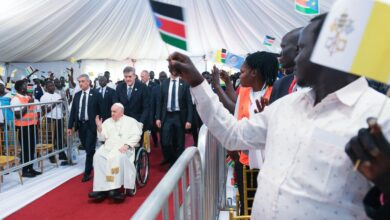The Egyptian Orthodox Church’s stance against a recent Administrative Court ruling obliging the church to allow second marriages for Coptic divorcees is not at all peculiar. In defiance of the judiciary, priests have repeated a slogan, commonly used by Islamic extremists, that there should be no obedience to those who disobey God.
This situation is not unfamiliar. Since the early 1970s, Egypt has undergone a gradual process of “religionization”, whereby outward displays of faith have marked all facets of life. Initially termed a “religious awakening”, this process promotes form with no substance, and pays little attention to whether forcing religion into everything actually benefits Egypt’s unity, public morality and social relations.
The first sign of the state’s “religionization” was when former President Anwar Sadat was nicknamed by his government “the faithful president”. During his ten-year rule, Sadat would often appear on television carrying prayer beads and performing his Friday prayers at local mosques.
Shortly after Sadat became president, the pious Cyril VI (former Pope of the Coptic Orthodox Church of Alexandria) passed away and was replaced by Shenouda III. Pope Shenouda–then in his early fifties–represented a fundamentalist current within the Egyptian Church. He believed that mere spiritual leadership was insufficient for a man in his position, and for the first time we began hearing about “Coptic people” resorting to the church to resolve their religious and social problems. The state, meanwhile, did not show much care for its citizens, regardless of their beliefs.
This period also witnessed the migration of millions of Egyptian workers to oil-rich Gulf countries. These migrants would be influenced by the Gulf’s desert culture and prevailing radical Wahhabi interpretations of Islam. Meanwhile, leaders of the Muslim Brotherhood, who had fled Egypt under Nasser, were returning home and finding their way into Egyptian media. Religious groups were being encouraged to counter leftist and nationalist forces across the country.
Soon thereafter dozens of preachers appeared on cable and satellite television channels. They began telling young Muslim women wear the hijab (headscarf) in order to distinguish themselves from their Christian counterparts, insisting that this practice was one of the pillars of Islam. Muslim men were advised to grow their beards and shave their mustaches. It’s no surprise then that Christian women began to wear large crosses around their necks, and Christian men tattooed crosses on their wrists.
In 1980, Sadat’s government amended Article II of the Constitution to recognize Islamic Sharia as the main source of state legislation. In doing so, the government sought to appease rising Islamist movements and secure their approval for scrapping presidential term limits, which until then were set at two years. The Islamic extremists, of course, used the new article to legally thwart new ideas and creative endeavors.
Even football has been “religionized”. Whenever our national team scores a goal, our celebrating players prostrate on the pitch while the coach raises his arms toward the sky to thank God. Our children watch these displays every day and foolishly grow to like them. When I play football with my five-year-old grandson, I’m shocked to see him emulate these gestures, thinking they are an integral part of the game.
“Religionization” has corrupted the minds of those who grew up under former President Sadat and current President Hosni Mubarak. Today, many from this generation–with their distorted ideas–hold important government posts.
Our country has succumbed to the power of religious leaders and preachers who, despite all their differences, agree on one thing: fighting secularism to preserve their authority over under-educated and illiterate people.
The Egyptian state and society has been “religionized” by the ruling National Democratic Party, its supporters in the Coptic Orthodox Church, and Islamic conservatives.
To those who have been ruling this country for four decades, I say prepare to reap your bitter harvest.
Translated from the Arabic Edition.




